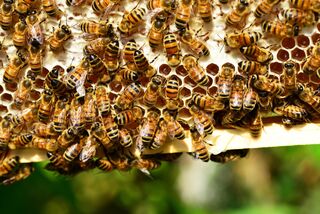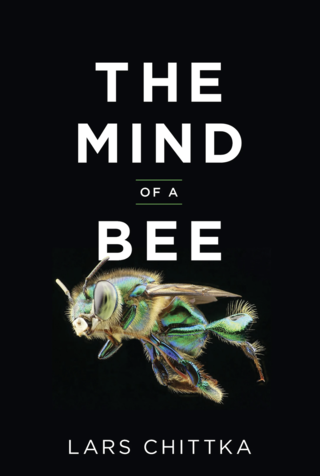Intelligence
The Fascinating Complex Minds of Bees and Why They Matter
Research shows bees are profoundly intelligent beings with very active brains.
Posted July 23, 2022 Reviewed by Vanessa Lancaster
Key points
- Lars Chittka discusses how bees perceive the world in a new book called The Mind of a Bee.
- Chittka's book explores the fascinating question of how much intelligence can be squeezed into a tiny speck of nervous tissue.
- Chittka says bees have a rich inner world, a unique perception, and like us, are able to think, enjoy, and suffer.

Bees are remarkably intelligent beings. They display highly evolved cognitive abilities and various emotions. The more I learn about them, the more fascinated I am with what research is revealing about their very active minds—what it feels like to be a bee—and ecological importance.1
The world is full of all sorts of diverse "alien" intelligences, and I'm thrilled bee expert Lars Chittka could take the time to answer a few questions about his landmark new book, The Mind of a Bee.
Marc Bekoff: Why did you write The Mind of a Bee?
Lars Chittka: Few people are aware that we are currently seeing the beginnings of a new Copernican revolution—the realisation that human minds are not the only ones and that truly “alien minds” are right around us on our home planet. This includes the minds of strange creatures like the octopus and, you guessed it, those of bees.
These creatures perceive the world and think and feel about it in completely different ways from how we do, but these ways are no less valid. This is what I wanted to write about—how researchers over the last few decades became increasingly fascinated with these insects’ psychology and how this research has transfigured our view of other minds.

MB: How does your book relate to your background and general areas of interest?
Since youth, I have had a fascination for the strangeness of insects and their depiction in pop culture and literature. I loved the swarms of robotic insects in The Invincible by Stanisław Lem and the portrait of a fly on the cover of The Cure’s single “The Walk.”
Thus I was delighted to learn as a student that insects had completely different senses compared to ours, senses that allowed them to see polarised and ultraviolet light, for example.
I was never interested in the brand of anthropocentric animal psychology displayed by many researchers of, for example, primates, who often laboriously teach their subjects to display elements of human-ness and then conclude, hey, they’re a little like us.
Perhaps so, but it’s always been the alien-ness of the animal minds that attracted me, and this can be more easily found in animals distantly related to us.
MB: Who is your intended audience?
LC: The book is written in a popular scientific style, with target audiences among scientists, beekeepers, and the general public. The public is fascinated to learn about the strange sensory world of bees, as well as their remarkable learning abilities.
At the same time, the scientific progress in the field of bee cognition has important implications for numerous fields—from ethology, through comparative cognition and computational neuroscience to engineering (e.g., in the control of unmanned aerial vehicles)—but these findings have never been presented in a single book for scientific audiences either.
MB: What are some of the topics you weave into your book, and what are some of your major messages?
LC: Bees were once thought to be just cleverly designed biorobots, able to construct elaborate comb architectures, have labour division and climate control—but all of this delivered by reflex machines governed entirely by reflex machines governed entirely by innate behaviour.
New research covered in this book reveals that bees are profoundly intelligent creatures with individually distinct personalities that can recognize flowers and human faces, count, and display tool use which they can even learn by observing others.
In the book, I take readers from an insect’s unique and strange sensory world to the exploration of their consciousness, to the exploration of their brains as elegantly miniaturised biological computing devices, and finally, the ethical implications that arise from the fact that bees are most likely sentient beings.
MB: How does your book differ from others that are concerned with some of the same general topics?
LC: Books with a focus on animal minds have been written about the “traditional” large-brained models of animal intelligence, such as primates or corvid birds—examples are: Nathan Emery’s Bird Brain: An Exploration of Avian Intelligence or Frans de Waal’s Are We Smart Enough to Know How Smart Animals Are. I like Other Minds: The Octopus, the Sea, and the Deep Origins of Consciousness by Peter Godfrey-Smith.
My book focuses on the fascinating microcomputer that is the bees’ brain and the question of how much intelligence can be squeezed into a tiny speck of nervous tissue. I make an attempt to take readers into the cockpit of a bee, to see what the world is like from its vantage point, and take this as a starting point for the psychological and philosophical exploration of bees’ unique mind.
The book also has a deep historical perspective—bee scientists have for centuries including some of the world’s finest weirdos, and I hope that readers will enjoy getting to meet them.
MB: Are you hopeful that as people learn more about the amazing lives of bees, they will treat them with more respect and dignity?
LC: Yes, I think that the exploration of bee psychology has important ethical implications for their conservation and for how they are treated in research laboratories as well as in industrialised beekeeping. Many people are aware that wild bees are in trouble because of wide-scale habitat loss, pesticides, and disease and that this spells trouble because we need bees to pollinate our crops and garden flowers.
But is bees’ utility for humans the only reason that they should be protected? I think not. The insight that bees have a rich inner world, a unique perception, and like us, are able to think, to enjoy, and to suffer, commands a respect for the diversity of minds in the natural world, and with it comes an obligation to protect the environments that shaped these other minds.
Their conservation should be as much of a priority as that of orangutans or Siberian tigers. However, contrary to the threat to such iconic species, everyone with access to green space (even as small as a flower box on a balcony) can do something to help by planting the type of suitable flower resources that large-scale industrial agriculture has wiped out across the countryside.
By understanding a bee's psychology, one can predict their ecological needs and thus work for the benefit of their conservation.
References
In conversation with Lars Chittka, a German zoologist, ethologist and ecologist and Professor of Sensory and Behavioural Ecology at Queen Mary, University of London. He is also the founder of the Research Centre for Psychology at Queen Mary. Lars has written over 250 articles on the evolution of sensory systems and cognition using insect-flower interactions as a model system. He has made fundamental contributions to our understanding of animal cognition and its impact on evolutionary fitness studying bumblebees and honeybees and is a recipient of the Royal Society Wolfson Research Merit Award and an elected member of the German National Academy of Sciences.
1) For more information on the rich cognitive and emotional lives of bees click here.
What Does It Feel Like to Be a Honeybee?
Happy Bees: Bumblebees Show Dopamine-Based Positive Emotions.
Emotional honeybees and brainy jellyfish: More "surprises" in animal behavior.
Exploring a Fascinating Universe of Different Kinds of Minds.




